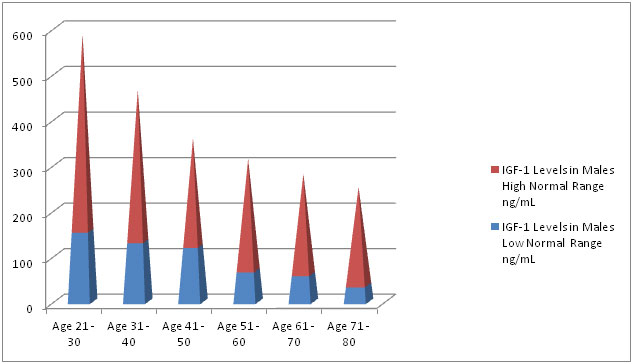HGH Levels in Men by Age Chart

When a man contacts a hormone doctor to discuss the symptoms of aging that are affecting his life, he wants answers as to whether or not a condition called adult growth hormone deficiency is the cause. Fatigue, weight gain, low sex drive, muscle loss, decreased bone density, and memory issues are all part of the warning signs that will lead to blood analysis to determine HGH levels in men.
Diagnosis is a simple process, but not necessarily in the way most people expect. Checking HGH levels in males is tricky because once the pituitary gland secretes HGH into the bloodstream, it only lasts ten to twenty minutes as it races through the circulatory system seeking out its many receptor cells. Then it disappears, leaving behind its vital signals that affect bodily functions.
HGH does do one important thing that makes it easy for doctors to measure its levels – it stimulates the liver to release insulin growth factor 1 into the bloodstream, where it maintains a relatively constant level throughout the day in response to the amount of growth hormone the liver receives.
If IGF-1 levels are low, and the individual has symptoms associated with GH decline, the doctor will diagnose growth hormone deficiency and prescribe HGH therapy. During the blood analysis, the hormone specialist also measures other crucial levels to rule out health concerns that could be the cause of the changes.
The HGH levels in men by age chart below shows low IGF-1 levels in the blue bar- denoting possible HGH deficiency. Everything in red falls into the normal range of IGF-1 for that age group.

If IGF-1 test results fall within the blue range, the doctor is likely to prescribe human growth hormone therapy to raise HGH levels.
Diagnosing Low HGH Levels in Men
When looking at the results of the IGF-1 blood test, the doctor will also take into account a man’s lifestyle habits and overall health that can affect growth hormone secretion, including:
- Sleep
- Exercise
- Nutrition
- Stress
- Illness
- Medications
- Injury
Any or all of these factors can affect HGH levels in men, causing a hormonal imbalance. In some cases, when a person is only beginning to get to the lower end of the spectrum, making certain changes, such as increasing sleep or exercise, can make a difference in growth hormone secretion.
A proper diagnosis is crucial because low levels of HGH and IGF-1 in adults increases the risk of cardiovascular disease, type 2 diabetes, osteoporosis, and additional health concerns.
Doctors diagnose low HGH levels in males by the changes occurring in the body along with the following IGF-1 test results:
- HGH Levels in Men – Adult Baseline
The average 19 to 21-year-old male has between 281 and 510 ng/mL of IGF-1 in his bloodstream. Between the ages of 21 and 30, that range drops to 155 – 432 ng/mL. At this time, there should not be any symptoms of GH decline.
- HGH Levels in Men Over 30
As IGF-1 levels decline to between 132 – 333 ng/mL during this decade, hair may start to turn gray, pants may feel a bit snug, muscle growth may not respond to regular exercise, crow’s feet may appear around the eyes, and libido may slow down.
- HGH Levels in Men Over 40
Between the ages of 41 and 50, IGF-1 levels will fall to 121 – 237 ng/mL. This may result in thinning hair, the need for reading glasses, insomnia, additional weight gain, loss of lean muscle, joint pains, stiffness, some forgetfulness, and changes in skin tone and texture.
- HGH Levels in Men Over 50
As IGF-1 levels drop to 68 – 245 ng/mL between the ages of 51 and 60, fatigue, weight gain, longer recovery from injury or illness, poor memory, muscle and bone loss, depression, low sex drive, and decreasing eyesight may all cause concern for the future. The start of the mid-life crisis often coincides with low HGH levels.
- HGH Levels in Men Over 60
With an HGH deficiency and IGF-1 decline that reaches 60 – 220 ng/mL, the changes in the body and one’s health cannot be ignored. Sex may be a thing of the past, memory and cognitive impairment may be affecting career opportunities, energy levels could be non-existent and emotional upheaval and depression could ruin relationships. Health concerns such as heart disease, type 2 diabetes, osteoporosis, and even dementia could be present.
- HGH Levels in Men Over 70
The issues above all worsen as IGF-1 levels drop to between 36 – 215 ng/mL.
As you see by the IGF-1 growth hormone levels chart, seeking the help of an experienced hormone replacement therapy specialist is crucial if there is a concern over low HGH levels. Please contact HT Medical Center for a free consultation to learn more.
















